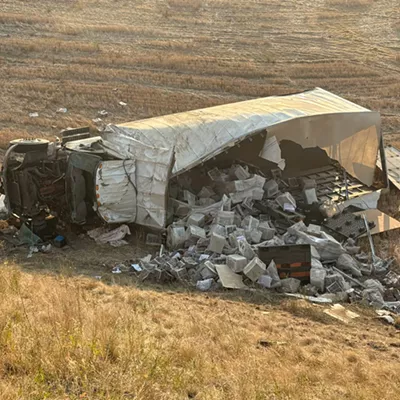For some, getting hassled for spare change is as familiar to their work routine as meetings and trips to the office coffeepot. For some, panhandlers are just everyday faces; for others like Betty Findley, they are the thorns in the sides of perfect days and threats to seamless downtown shopping trips.
When Findley assumed her position as vice president of the community-based policing effort known as COPS Downtown, she was asked to consider what she first saw when entering downtown. Panhandlers came to mind.
In early March, Findley came up with a way to curb the efforts of downtown panhandlers -- competition.
In her pitch, Findley suggested to her board that nonprofits that serve the homeless population should stake out "frequently panhandled areas" and ask for change themselves, directly competing with individual homeless panhandlers. In her mind, if people knew that their pocket-linted spare pennies were going to a charity instead of a six-pack, then panhandling might not be so bothersome.
"If we could do it as a charity and take the money to the charities, then I don't think people would be so against the idea [of panhandling]," Findley says.
In her invitation to the media and nonprofit organizations, Findley noted that "misguided charitable giving" results in panhandlers using the money "on illicit vices instead of the staples and necessities that it should be used for."
"I think [panhandling is] wrong," Findley says. "Being a person who works for everything, I feel abused by panhandling when we have children and families who need the real help. Not that these people don't need help, but some of them don't.
"It's hard for women to come downtown to shop if they are going to get hit up for money every two blocks," she continues, noting that her proposal is written in the best interests of Spokane's downtown. "A lot of people will eat at the House of Charity and then go up to the corner and say 'I'm hungry.'
"We are really not trying to be mean to the panhandlers, but to be mean to the things that they do with the money," Findley adds.
When Kim Rasp, a member of the Spokane Homeless Coalition's Leadership Board, heard Findley's unconventional proposal, she was outraged.
"It was an ouch," she says.
Rasp, who works as director of resident services for Spokane Housing Ventures, says that many of the homeless people who she works with do many things to avoid panhandling.
"We actually see people who sell their plasma, who recycle, who panhandle, who dumpster-dive -- all to make ends meet," Rasp says. "To pigeonhole panhandling as a homeless activity, I don't think that's right."
Dale Briese, another member of the Homeless Coalition's Leadership Board, agrees: "Panhandling is not a homeless problem," he says, "it's a low-income problem."
Briese notes that even if Findley's plan were to be executed, there's no way that local nonprofits could make it work.
"Some charities work with only men, some work with only families, some work with only females -- who is going to delegate the funding streams?" Briese says.
"It's like a leaky pipe -- if you plug one hole, it's going to come out somewhere else," Briese says. "[Panhandling is] larger than the city of Spokane. If we flush it out, it just goes to outlying areas."
After a few meetings, Findley's original plan has evolved into producing a series of public service announcements in which viewers are shown what panhandlers do with their money.
"Some of them might be quite graphic to show where the money goes," Findley says. "[People will] realize they are really killing these people, that [giving money] is detrimental to them."
Rasp thinks that Findley's new plan is just as dangerous as her first one: "I think what they are looking at is a little bit of shock appeal. I think Mr. Lexus will drive up and give someone a $5 bill, and then the next scene would show someone shooting a needle in their neck," Rasp says. "What I would hope wouldn't happen would be that Mr. Lexus would stop giving all together.
"Personally, I don't give panhandlers money," says Rasp. "Do I give them granola bars with my business card attached? Of course I do."
To get involved, contact Betty Findley at COPS Downtown at 625-3350. The Spokane Homeless Coalition can be reached at info@spokanehomeless.org.














